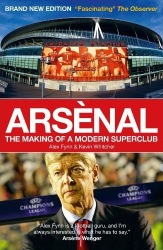I'm not sure that the definitive story of the Wenger Years will ever be told unless Wenger himself writes a no-holds-barred autobiography. So unless, or until, he does this title will certainly remain the nearest thing we'll ever get to the full insider story of how Arsenal moved forward under Wenger's regime. When I reviewed the 2008 edition I wrote "Essentially this book delves into the background saga that has taken Arsenal from being a rather famous football club to, as the title suggests, a modern superclub that ranks up there with the big boys of European and therefore world club football. Better still it does so in a thoroughly entertaining and informative way". This revised, updated and expanded version with five added chapters can also be described thus.
It is written by two unlikely collaborators in Alex Fynn and Kevin Whitcher who come at the Club from entirely different angles. The bottom line being that ultimately what they don't know about Arsenal is probably not worth knowing. To quote Arsene Wenger himself "Alex Fynn is a football guru" and Kevin of course is well known as the editor of Arsenal's top selling fanzine 'The Gooner'. So within these pages there is more than enough of interest for any fan whose love of our Club goes well beyond just what we get to see on the pitch.
This brand new edition comes at a time when the rank and file supporters of Arsenal are polarised in their disparate take on the current plight of the Wenger years. Given our lean trophy-free state of late I can't see this edition being as big a seller as its predecessors given that most fans spend more money in the good times when the Arsenal story lines are a joy to be reminded about. That said and despite the current mistrust of Wenger that doesn't prevent it being a fascinating read. One which brings a certain prominence to an area that perhaps hasn't been mentioned often enough in the Arsenal/Arsene saga. And that is just how many board room squabbles, spats, back-stabbings, manoeuvrings and acquisitions of fellow directors and wannabe directors shareholdings there have been during Wenger's time. The off field power struggles and 180 degree turns cannot have been at all helpful to Le Boss and it strikes me that many club managers wouldn't have survived such perpetual upheaval and lack of cohesive direction behind the scenes. Especially so when also taking on a mega-move and major financial headaches at the same time.
The backroom saga in brief is thus: Simplistically David Dein who introduced Wenger to Arsenal was in many ways his right hand man and confidant. But Dein has both sh*t on and been sh*t upon by his fellow directors during the Wenger years, both for good or bad reasons depending upon your perspective. He walked away with a massive fortune but many feel he dropped the Club, or certainly fellow directors, right in it. His final act being to bring in the very rich but very much unwanted Usmanov, a man about whom much more would no doubt be written if he wasn't so litigious. Hill-Wood, who sold out to Dein because he said there was no money to be made in football has played the numerous roles of innocuous chief muppet, yes man, fall guy, sad old Etonian clown and patsy. Kroenke has gone from public enemy number one to back seat owner. Quite possibly he'd be welcomed by fans should he ever open his mouth and reveal his plans. Unless of course impersonating a helmsman on a rudderless ship is his plan.
Fizsman was the unassuming strong and silent type who moved mountains, kicked out Dein for reasons that as yet are still only guessed about and later did a 180 degree turn and sold out to Kroenke. He did all this with a minority shareholding and some old school backing. Danny was the biggest mover, groover and influencer but left no dynastic heritage for the Club, unlike the previous family ownership's who claimed guardianship but essentially just farted about with a football club. Lady Nina was unwanted on voyage, wanted on voyage and then dismissed on voyage. The Carr family were mere observers who trousered the goodies when opportunity beckoned. It seems that Ken Friar was the only nice guy throughout, a trusted employee made good who was perpetually recalled from retirement to bridge gaps and do the real work. If there was one thing I really wanted this book to tell me it was why Edelman, the Fiszman appointed boss and lover of plain concrete, was dismissed with a fat wedge. It failed me in that respect, but that apart it covers the shifting and sometimes perhaps shifty doings of the major players in the Club’s ownership struggles very well indeed. As it does the changing managing directors, CEOs and gap years when Fiszman was were quite happy to even do without a new CEO. The above is of course my own crude summation of a very complex saga but this title provides far more detail and the real nitty gritty.
Its a good story and a fine volume which is well executed, as were all previous editions, but the timing seems a tad strange given the barren mode in which the Club currently exists. I suspect a further and final edition will eventually hit the bookshops and will probably arrive very soon after Wenger's departure when it will have a real chance of providing the definitive verdict on the Wenger years.
‘Arsènal: The Making of a Modern Superclub’ by Alex Fynn and Kevin Whitcher is available in paperback from publishers Vision Sports for a reduced price of £6.99 including postage if you use the promo code ‘Gooner’ on the page that appears after you click ‘buy now’. Click here to order. It can also be purchased in Arsenal’s own stores and leading bookshops.







